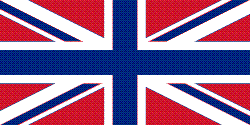The Union Steve?
Ah yes, I remember the other thing I wanted to post about.
This has recently appeared on the flag pole on Jubilee Gardens.

( Read more... )
This has recently appeared on the flag pole on Jubilee Gardens.

( Read more... )
Comments 12
I learned a couple of years ago that the Union Flag is actually a bit more complicated than I thought. It's composed of the flags of St George (argent, a cross gules), St Andrew (azure, a saltire argent) and St Patrick (argent, a saltire gules) but the way the flags of Ss Andrew and Patrick are combined turns out to be more complex than I'd previously understood: it's a saltire (X-shaped cross) divided into eight segments (gyronny) alternating white (argent) and red (gules) starting from the top-left segment. This is displayed on a blue (azure) field, but to avoid having red on blue (which isn't easily distinguishable from a distance) the whole thing is given a white edging (fimbriated argent). This is why some of the white stripes are wider than the others. Finally, a white-edged red cross (a cross gules ( ... )
Reply
In retrospect you're probably the person I'd have thought most likely to know if it was an official thing.
I did suspect that it's a protest. But damned if I can tell what it's in aid of.
Reply
Reply
More recently, the flag of St David (sable, a cross or) has risen in popularity, as has the flag of St Piran in Cornwall. I guess these are both alternative candidates for incorporation into a redesigned Union flag, although the result would end up being rather complicated.
Reply
Fact-ette though - apparently the Philippines swap the colours round on their flag when they're at war.
Neil.
Reply
Reply
Leave a comment